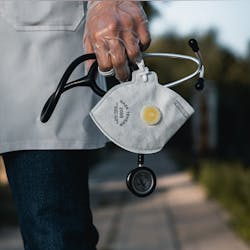Transparent masks may improve daily communication and patient-clinician interactions
The widespread use of masks during the COVID-19 pandemic has posed numerous communication barriers, muffling speech and impeding lip-reading. For deaf or hard-of-hearing (DHH) people, masks have made daily, as well as clinical, interactions especially difficult.
With approximately 72% of people older than 65 experiencing hearing loss, and with this age group having higher hospitalization rates compared to others, the increased availability of transparent masks may be particularly important in healthcare settings.
A research team led by investigators from Brigham and Women’s Hospital and the Massachusetts Institute of Technology evaluated attitudes toward their newly engineered, transparent mask by surveying members of the general population and healthcare workers, including DHH healthcare workers. They reported that 91% of DHH healthcare workers felt that communication would be easier with a transparent mask, with positive expectations from other healthcare workers and the general population as well. The results of their surveys are published in JAMA Network Open.
“Transparent masks have the potential to address or overcome barriers of communication, especially within healthcare settings,” said corresponding author Giovanni Traverso, MB, BChir, PhD, of the Brigham’s Division of Gastroenterology and the Department of Mechanical Engineering at MIT. “It’s a simple message, but it’s important. Patient interactions are critical and there are measures we can take to improve them.”
When members of the general population and health care workers were shown a video of an individual smiling beneath an opaque N95 mask, only 20-25% were able to identify the corresponding emotion as “happy.” This number increased to roughly 78-88% of respondents when the model wore a transparent N95 mask.
Among clinicians, nearly two-thirds of general healthcare workers and 82%of DHH healthcare workers felt positively about wearing a transparent mask to communicate with patients, with roughly the same proportions, respectively, stating that opaque masks worsened communication with patients. The 123 general healthcare workers who responded to the survey were employees of Mass General Brigham and the 45 DHH respondents were affiliates of the Association of Medical Professionals with Hearing Losses.
To evaluate perspectives on transparent masks within the general population, the researchers polled 1,000 U.S. adults representative of the national population using the online, opt-in survey provider, YouGov. Forty-five percent of these respondents reported feeling positively about interacting with a healthcare worker wearing a transparent mask and 36.6% felt neutrally.
The study’s authors hope that their results will demonstrate the utility of transparent masks, especially for DHH individuals. The authors are part of a larger team of Mass General Brigham and MIT researchers who have engineered a transparent and reusable mask called the TEAL Respirator, which they are working to deploy in hospitals through the efforts of Teal Bio.

